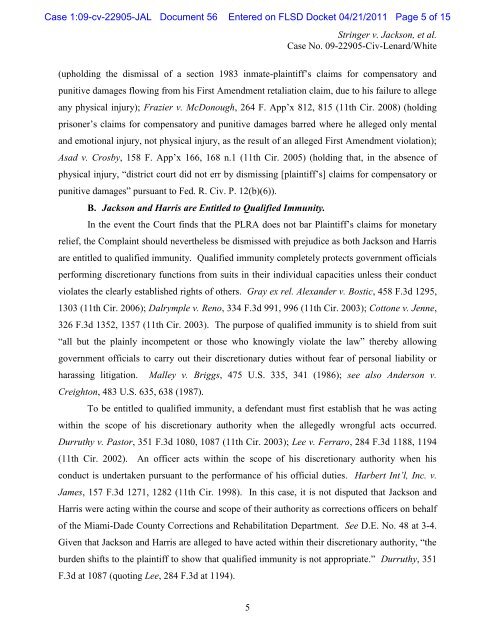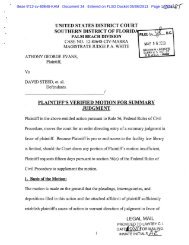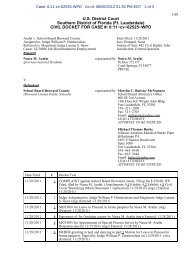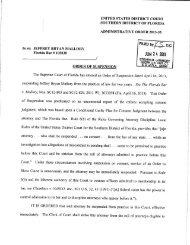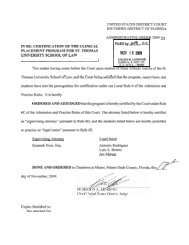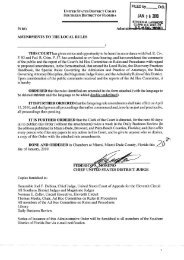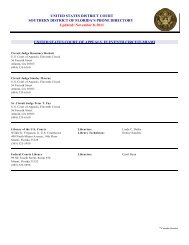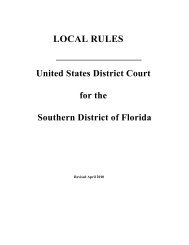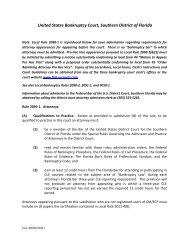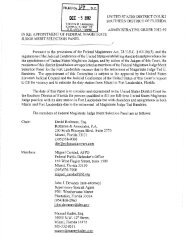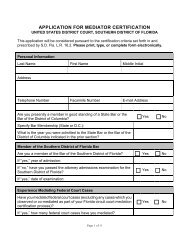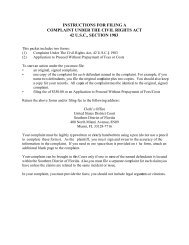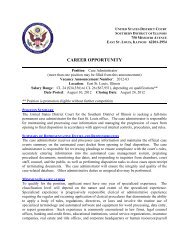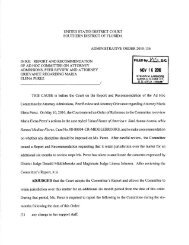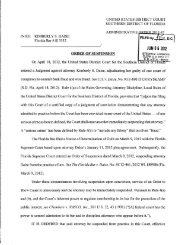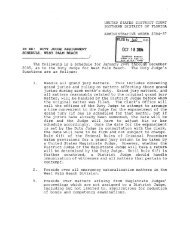US District Court Southern District of Florida (Miami) - United States ...
US District Court Southern District of Florida (Miami) - United States ...
US District Court Southern District of Florida (Miami) - United States ...
You also want an ePaper? Increase the reach of your titles
YUMPU automatically turns print PDFs into web optimized ePapers that Google loves.
Case 1:09-cv-22905-JAL Document 56 Entered on FLSD Docket 04/21/2011 Page 5 <strong>of</strong> 15<br />
5<br />
Stringer v. Jackson, et al.<br />
Case No. 09-22905-Civ-Lenard/White<br />
(upholding the dismissal <strong>of</strong> a section 1983 inmate-plaintiff‘s claims for compensatory and<br />
punitive damages flowing from his First Amendment retaliation claim, due to his failure to allege<br />
any physical injury); Frazier v. McDonough, 264 F. App‘x 812, 815 (11th Cir. 2008) (holding<br />
prisoner‘s claims for compensatory and punitive damages barred where he alleged only mental<br />
and emotional injury, not physical injury, as the result <strong>of</strong> an alleged First Amendment violation);<br />
Asad v. Crosby, 158 F. App‘x 166, 168 n.1 (11th Cir. 2005) (holding that, in the absence <strong>of</strong><br />
physical injury, ―district court did not err by dismissing [plaintiff‘s] claims for compensatory or<br />
punitive damages‖ pursuant to Fed. R. Civ. P. 12(b)(6)).<br />
B. Jackson and Harris are Entitled to Qualified Immunity.<br />
In the event the <strong>Court</strong> finds that the PLRA does not bar Plaintiff‘s claims for monetary<br />
relief, the Complaint should nevertheless be dismissed with prejudice as both Jackson and Harris<br />
are entitled to qualified immunity. Qualified immunity completely protects government <strong>of</strong>ficials<br />
performing discretionary functions from suits in their individual capacities unless their conduct<br />
violates the clearly established rights <strong>of</strong> others. Gray ex rel. Alexander v. Bostic, 458 F.3d 1295,<br />
1303 (11th Cir. 2006); Dalrymple v. Reno, 334 F.3d 991, 996 (11th Cir. 2003); Cottone v. Jenne,<br />
326 F.3d 1352, 1357 (11th Cir. 2003). The purpose <strong>of</strong> qualified immunity is to shield from suit<br />
―all but the plainly incompetent or those who knowingly violate the law‖ thereby allowing<br />
government <strong>of</strong>ficials to carry out their discretionary duties without fear <strong>of</strong> personal liability or<br />
harassing litigation. Malley v. Briggs, 475 U.S. 335, 341 (1986); see also Anderson v.<br />
Creighton, 483 U.S. 635, 638 (1987).<br />
To be entitled to qualified immunity, a defendant must first establish that he was acting<br />
within the scope <strong>of</strong> his discretionary authority when the allegedly wrongful acts occurred.<br />
Durruthy v. Pastor, 351 F.3d 1080, 1087 (11th Cir. 2003); Lee v. Ferraro, 284 F.3d 1188, 1194<br />
(11th Cir. 2002). An <strong>of</strong>ficer acts within the scope <strong>of</strong> his discretionary authority when his<br />
conduct is undertaken pursuant to the performance <strong>of</strong> his <strong>of</strong>ficial duties. Harbert Int’l, Inc. v.<br />
James, 157 F.3d 1271, 1282 (11th Cir. 1998). In this case, it is not disputed that Jackson and<br />
Harris were acting within the course and scope <strong>of</strong> their authority as corrections <strong>of</strong>ficers on behalf<br />
<strong>of</strong> the <strong>Miami</strong>-Dade County Corrections and Rehabilitation Department. See D.E. No. 48 at 3-4.<br />
Given that Jackson and Harris are alleged to have acted within their discretionary authority, ―the<br />
burden shifts to the plaintiff to show that qualified immunity is not appropriate.‖ Durruthy, 351<br />
F.3d at 1087 (quoting Lee, 284 F.3d at 1194).


